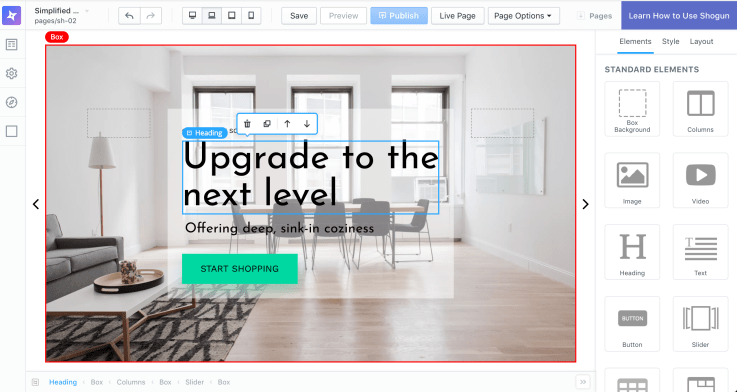
Finbarr Taylor and Nick Raushenbush had started a little side project that was making just about enough money to keep the site’s lights on while they were working on their next plans.
Then, a few months later, Shogun — a tool to help small businesses build shopfronts for sites like Shopify — started making a bit more. After a few months, it went from a nice dinner to a solid contributions to a savings account, and then enough to pay for a real salary. That’s when Taylor and Raushenbush, who had started Shogun as a side project, realized that though it took a while to get rolling, people were signing up and using it and were actually paying for it. That’s why the two decided to start working on Shogun full-time, which is now looking to expand beyond to a general-purpose storefront for businesses trying to get online. Shogun is coming out of Y Combinator’s 2018 winter class.
“It was starting to take more free time, every morning and every night I was doing more support,” Taylor said. It was signifiant enough to the point where we said, ‘this isn’t something that is just a side business. We think that this actually is a startup.’ When we came to the [Y Combinator] interview, it was a pretty compelling case of this startup that had dug itself back up from the dead.”
Shogun boils down to an easy-to-use page editor that allows small businesses to build an online storefront. It plugs directly into Shopify and other eCommerce services, and lets nontechnical owners or founders get their products online in a simple and appealing way for consumers. Rather than just going through a platform like, say, Amazon, a tool like this — borne from the frustration of Taylor and Raushenbush working with nontechnical folks needing to edit a page — would allow those businesses to do something more customized. That does mean, of course, that it’s going to be competing with design services like Webflow, but Taylor said that it is trying to orient itself toward nontechnical users rather than more developer-centric tools.

While Shogun had basically been making enough money to pay the bills — to the point that it might have made sense to just keep rolling and maybe take on some new financing down the line — the two still decided to go through Y Combinator to get access to the advice for what Taylor calls “course correction.” Rather than just moving forward with what they thought was the best idea, Taylor and Raushenbush wanted access to the firm’s network to basically tell them, no, that’s a dumb idea, and try this instead.
Shogun at its heart is a page builder, and that’s what the original target was as the pair started pitching it around to agencies (Raushenbush had some experience in the video creative side as well). And it was generally well-received, but it was to the point that the feedback was the service was great for something like Shopify — and not much else. The pair just left the lights on for it and continued to explore other things, but that use case turned out to be much bigger than anticipated and methodically grew into something that could actually morph into a real business. In April last year, the two decided to work on it full-time, and begin looking beyond just Shopify.
“It’s at all different levels,” Taylor said. “It’s for some entrepreneurs, for some just starting out, and even for some with established businesses. They want to customize their storefront. The only option for them to do that is to hire a developer to make custom pages. We come in and say, they can one click install this app, and they can drag and drop really beautiful, custom, seamless pages that integrated perfectly with the rest of their eCommerce store.”



